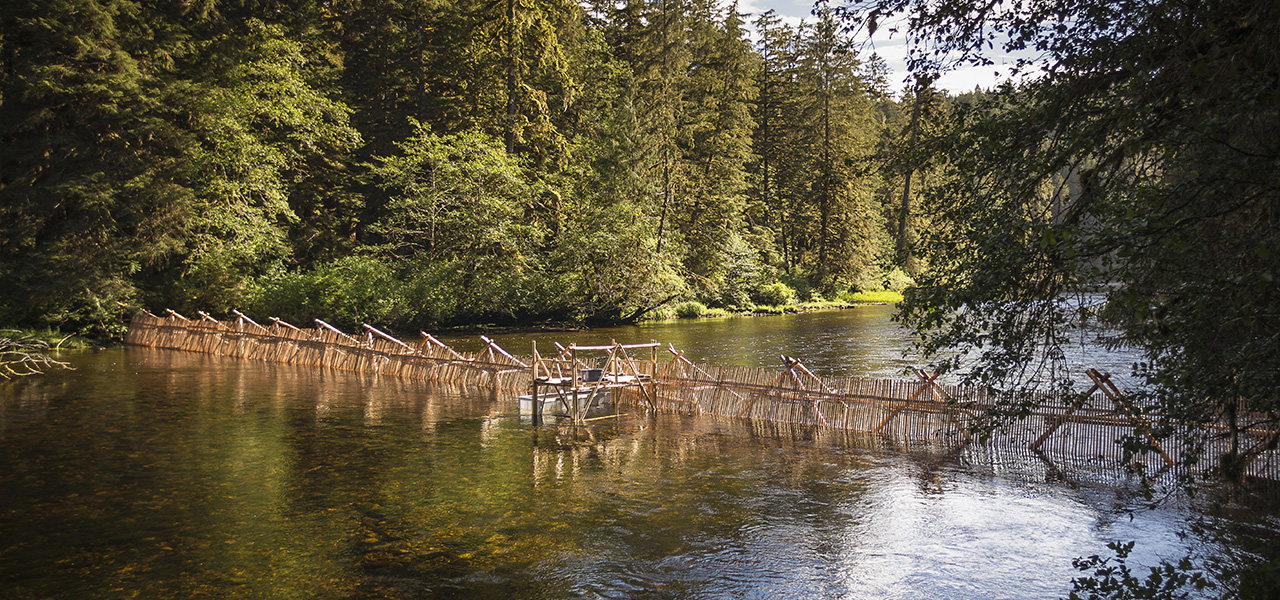
First Nations on the BC coast, including the Heiltsuk, are deeply connected to the ocean and have harvested its resources for thousands of years, developing tools and practices to responsibly manage different species they depend upon. The weir—an innovative cedar fence built across a river—is one such tool that has been used by Heiltsuk people for millennia to catch salmon as they returned to spawn each year.
In 2013, Qqs (pronounced “kucks”) Projects Society in Bella Bella, British Columbia, and the Heiltsuk Integrated Resource Management Department revitalized the ancient tradition and established the first traditional fish weir on the lower Koeye River in more than a century. The initiative was supported by MakeWay through the Taku & BC Coast Capacity for Conservation Fund and the Dragonfly Strategic Grantmaking Fund, and involved members of the community, including Heiltsuk youth, coming together to build the weir and reconnect with their roots.
“We are trying to figure out exactly how much salmon we have in our systems so that we know how much salmon we can take for the next season and know that we still have enough salmon making it up the river systems to continue on our harvesting,” explains Heiltsuk field technician Robert Johnson. Taking no more than you need is the heart of responsible resource management, but there is another important purpose to the knowledge gathered. “Using this information, we can develop strategies for managing salmon under a suite of future climate change scenarios,” says Will Atlas, Salmon Program Coordinator at Qqs. “The weir is an amazing tool. Historically, weirs were developed as a means of harvest but because they are such an efficient way of catching migrating salmon in a large river, it really lends itself well to tagging and enumerating, or counting, salmon as they swim upstream to Koeye Lake.”
Designated a conservancy in the Great Bear Rainforest Agreements, Koeye supports an incredibly diverse ecosystem; the watershed is the largest producer of sockeye salmon in the Heiltsuk territory, yet very little is known about the status of salmon on the central coast. By tagging fish at the weir and tracking them through their migration, Qqs is trying to determine how many adult sockeye are returning to Koeye, and how many smolts are coming out each year.
The Koeye River weir project is not only building a knowledge base for the community, but also a sense of belonging for Heiltsuk youth who are participating in the project as field technicians. The experience has allowed the youth to reconnect with their cultural heritage, feel closer to nature, and assume leadership roles in their own lives. “I grew up in the city and I didn’t really grow up knowing what to make important. And discovering my Heiltsuk roots—that job is important,” says Heiltsuk field technician Rob Duncan. “It’s been great to see how it could have been done back then, by my ancestors. It helped me recognize where I was from and brought me into leadership,” reflects another Heiltsuk field technician, Richard Wilson. Qqs also works closely with the Bella Bella community school, hosting several field trips each year to inspire the next generation of stewards. “Kids can get out on the land and see what we’re doing, and see that this type of work is a viable career that contributes to their community,” says Atlas.
The Koeye River weir is an example of blending traditional indigenous practices with conventional scientific research resulting in strengthening culture, a sense of community, and belonging, as well as scientific data to monitor and manage salmon populations. MakeWay supports grassroots regional and national initiatives that contribute to healthy watersheds and responsible resource management, and the Qqs salmon program is a remarkable example of stewardship, blending conventional science with indigenous knowledge, and community ownership. The Qqs River Weir is an ever-evolving initiative that will continue making an impact on the community and deepen our understanding of BC’s coastal salmon populations for years to come.
To learn more about the Qqs Projects Society’s Koeye River weir and MakeWay’s work to support freshwater and oceans, please contact Kim Hardy at kim.hardy@makeway.org.
